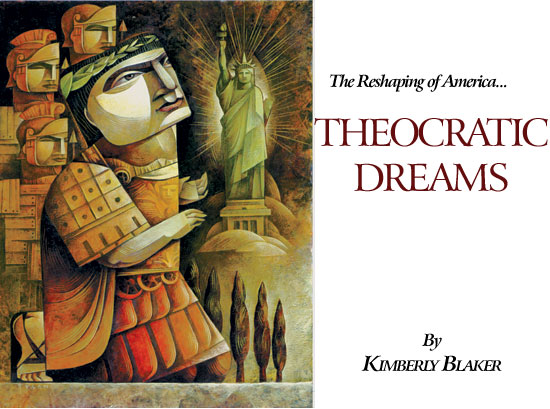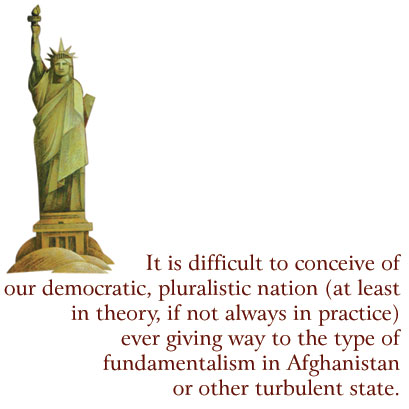The Reshaping of America…Theocratic Dreams
Kimberly Blaker July/August 2003
Getting your Trinity Audio player ready...

Illustrations by Sara Tyson

Last July at a gathering organized by the Center for Christian Statesmanship, House majority whip Tom DeLay (now House majority leader) declared, "I know there are some people that are worried about the faith-based initiative that the president supports. And most of the distress is . . . that 'we don't want the federal government coming into our business.' Well, my answer to that is Don't accept the money. But I see it as a great opportunity to bring God back into the public institutions of the country. God has been removed from all of our public institutions."
"You see," he further divulged, "I don't believe there is a separation of church and state. I think the Constitution is very clear. We have the right and the freedom to exercise our religion, no matter what it is, anywhere we choose to do it. We have an opportunity to once again get back into the public arena."
To a degree DeLay is correct. Americans do have the right to practice their religion anywhere they choose—so long as they neither trammel the freedoms of others nor violate our Constitution in doing so. But what DeLay and many others seem to fail to recognize is that the freedom to practice religion is not extended to our government bodies. Moreover, he makes abundantly clear a motivation behind the initiative in his admission that it is a way of "standing up and rebuking this notion of separation of church and state."
While most Americans, Christian or otherwise, recognize the importance of church and state separation, whether for the protection of church from the government or government from the church, a large and increasingly powerful minority is coming to despise freedom of religion in its truest sense: the freedom to practice any religion, or no religion, according to the dictates of one's own conscience.

Since September 11, 2001, Americans of all beliefs have decried Islamic fundamentalism, vowing to protect themselves from such extremism and the terrorism it lends itself to. Yet the short years since have proved detrimental to religious freedom and liberty in general, leading to the nagging question: Could America slip into a fundamentalist mode that parallels those of the nations we are desperately seeking to defend ourselves against?
The events of September 11 have paradoxically played right into the hands of fundamentalism here in America. This in spite of the obvious lessons of Osama bin Laden's jihad. Moreover, American theocrats have even managed to draw support from many moderates, as extreme right politicians have further fused God and Jesus with government, patriotism, and the warding off of Islamic fundamentalist evils.
It is difficult to conceive of our democratic, pluralistic nation (at least in theory, if not always in practice) ever giving way to the type of fundamentalism seen in Afghanistan or other turbulent states. Benjamin Beit-Hallahmi, professor of psychology at the University of Haifa in Israel, points out that in societies in which fundamentalism has taken control, the societies had never become fully secularized before fundamentalism took hold. So on the face of it fear of fundamentalist transformation here might seem to border on delusion. Yet there may, remotely, be some warrant to such paranoia.
R. Scott Appleby and Martin E. Marty wrote in Foreign Policy that, "deadly violence does occur, however, when brands of fundamentalism clash." (January/February 2002). As scholars of the Fundamentalism Project they point to cases of various fundamentalism colliding with each other within specific confines, such as in Pakistan or Africa. There may be some parallels, given the fact that many of those Americans most in favor of war with Iraq have been conservative, and particularly fundamentalist, Christians. While Saddam and his regime might not have been fundamentalist, America's association of the Middle East with Islamic fundamentalism, along with the fact that many Christian fundamentalists see war with the Middle East as a necessary prelude to the tribulation, introduces a disquieting element to our current conflict.
Seventy-nine of the world's 82 armed conflicts during the brief period of 1989 to 1992 were internal disputes rather than between countries. The implications are profound. Karen Armstrong, one of the foremost commentators on religious affairs in the U.S. and Great Britain, says in The Battle for God that it is improbable that any sort of militant extremist fundamentalism could gain enough popularity in the U.S. to threaten the public order. Nonetheless, she acknowledges that in an emergency state, such as economic or environmental catastrophe, such a force could gravely change the face of our nation. Says Armstrong: "Christianity, after all, was able to adapt to capitalism, which was alien to many of the teachings of Jesus. It could also be used to back a fascist ideology that, in drastically changed circumstances, might be necessary to maintain public order."
An emergency state is perhaps what should concern us at this particular moment in American history. To a degree, we have been in such since September 11. Similar to what Armstrong suggests, support for a politically militant Religious Right movement has dramatically increased since that fatal day, and religious conservatism has increasingly been played out in the public square. Should America fall victim to another significant terrorist assault in the not-so- distant future, given the significant erosion of the wall between church and state and the ravaging of constitutional protections since September 11, Armstrong's prediction could, though implausible, become reality. When people feel threatened, they simplify, or regress, says psychoanalyst Robert M. Young. They "eliminate the middle ground" and divide "the world into safe and threat, good and evil, life and death." We have been told that "every nation in every region now has a decision to make. Either you are with us, or you are with the terrorists." Our country has divided the whole world into good and evil, black and white; no gray can exist.
The ramifications of our war with Iraq, regardless of its outcome, are sobering. Should the war aims backfire, our economy, foreign relations, and our own safety are all at risk; and depending on the severity of any crisis, it could ultimately lead to serious reaction from America's fundamentalists. Scholars commonly refer to them as reactionary; their predictably unpredictable nature could pose real danger.
In contrast, if the war and Iraqi rehabilitation are successful, much of the present agenda will gain the support of a larger segment of mainstream Americans and could prove fatal to many hitherto cherished American liberties, most particularly true religious freedom.
The implications beseech us to examine how to protect faith, freedom, and security in America and to act resolutely in doing so. The solutions, while seemingly simple, will not be easy to actuate. These would be to convince all Americans of their duty to participate in the political process by deeply familiarizing themselves with candidates' backgrounds before voting, and then getting to the voting booths; convincing politicians to uphold our Constitution and Bill of Rights, even when a majority of the population (or seeming majority) is in opposition, and especially during times of high national security; and finally, exercising the necessary civic duty of convincing those religious conservatives inclined to do so that dismantling the wall between church and state most surely would result in their own loss of religious freedom. We must insist on the right to practice Christianity according to our own beliefs, versus being required to adhere to any particular faction that believes its particular doctrines and interpretations are correct and desires to be the controlling religious force in America.
George Grant, a conservative activist, noted in a revealing moment that "since only about 60 percent of the people are registered to vote and only about 35 percent of those actually bother to go to the polls, a candidate only needs to get the support of a small elite group of citizens to win." It is imperative that Christians, Jews, Muslims, Hindus, atheists, and all other faiths make a concerted effort to uphold religious liberty and diffuse the efforts of those dedicated to a more narrow religio-political agenda.
Unfortunately, secularization, that which freedom and democracy are dependent upon, also stimulates fundamentalism. We are in the ultimate catch-22. Religious extremism will not go away, so we and future generations must stringently strive to maintain both the wall between church and state and all other American freedoms, lest our more than two-century-old democracy fade into the annals of history.

____________
Kimberly Blaker is editor and coauthor of The Fundamentals of Extremism:the Christian Right in America. She also writes a syndicated column on church and state and the Religious Right. Kimberly writes from New Boston, Michigan.
____________

Kimberly Blaker writes provocatively but with considerable insight into the dangerous political and religious dynamic of our present situation. Liberty holds it a Christian's duty to obey civil authorities in all civil concerns and to honor God in all matters of conscience. We cannot be party to personal attacks on our leaders and do no service to God by personally attacking fellow believers, even if they are acting rashly. This and other articles commenting on current developments are offered by way of analysis and in the hope that tendencies to deny constitutional norms of religious liberty may be reversed, and that the many people of good faith rushing to advance religion against an undoubted threat may see the inherent danger in our present course.—Editor.